My Mental Health
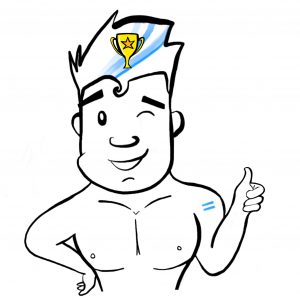

Mental health is a state of wellbeing. Good mental health helps you realize your potential, cope with the normal stresses of life, contribute to your community, interact effectively with others, and work productively. Mental health involves keeping perspective on what is normal and reasonable, and having the capacity to learn, to experience and manage emotions, to form and maintain relationships with others, and to effectively use coping mechanisms to manage stress and adversity.
Too often, people associate mental health with feeling happy. This is not entirely fair. While we all experience a breadth of emotions every day, we have been taught that some emotions are good (positive emotions) and some emotions are bad (negative emotions), and that we should emphasize the positive ones and eliminate the negative ones. How unfortunate, simplistic and unrealistic that is. Our emotions are simply our feelings and our reactions to events, and are neither positive nor negative. It is not our emotions, but how we respond to them and what we do with them that can have positive or negative outcomes. If you take an unfortunate tumble while skiing and as a result have to cancel your winter trip to Miami, assuming you were looking forward to the boys on South Beach, you are not likely to feel happy. Disappointment, frustration, and even anger are all reasonable and appropriate. If you become mired in those feelings, conclude the world is against you, and decide to never plan another trip, those are negative outcomes which you can chose not to put in place. If on the other hand you decide if you can’t go to South Beach then you will bring South Beach to you and invite all your friends to a beach party in your apartment, insisting of course that all the guys come in speedos, then you have implemented a positive outcome, and while maybe not a trip to Miami, you may well have some memorable experiences. When they lead to problem solving and new solutions, disappointment and frustration can be very positive emotions.
Just like physical health, mental health affects all aspects of our lives and so it is important to implement strategies to optimize our mental health. When we talk about physical health, we encourage people to exercise regularly, eat a nutritious diet, and get an appropriate amount of rest. These things will help you feel physically well. By the same token, we should take steps to help maintain our mental health. Ensure you schedule some down time on a regular basis to let your brain rest and fully process information. Spend time with friends you trust and talk with them about the things that are happening in your life. Talking out loud to a friend about something that is bothering us very often helps us sort through our feelings and reactions and gain perspective. Spend time doing things you enjoy and are good at. While we often think of doing this as a “reward”, regularly doing things we like gives us pleasure and frequently a sense of accomplishment. Lastly, remember the close interconnectedness between our physical and mental health. While keeping active with regular exercise, eating nutritious food and getting an appropriate amount of rest can do wonders for you physical health, they will also enhance your mental functioning and contribute to your sense of wellbeing. Similarly, doing things to maintain your mental health will increase your energy levels and contribute to your sense of physical wellness.
Over the course of your life, you may well experience a mental health problem. On average, 1 in 5 Canadians at some point will suffer from mental illness. Things that can put you at an increased risk for mental health problems include a family history of mental illness, a traumatic life experience, having a chronic medical condition, and alcohol and recreational drug use. Gay guys are at an increased risk of suffering from depression and anxiety. In a recent survey of guys living in and around Ottawa, 21% suffered from depression, anxiety or both. The reasons we are more likely to experience depression and anxiety are complex but are almost certainly related to whether as young guys growing up and as adults we have supportive families and friends and feel safe at school and in our work environment, or whether we feel isolated and vulnerable. Prolonged sadness or irritability, changes in your sleeping or eating habits, inability to cope with daily challenges, avoiding social interactions, frequent or increased sense of fear and anxiety, increased alcohol or substance use, and thoughts of self-harm are all warning signs of depression and anxiety. If you are experiencing one or more of these warning signs, you should make an appointment with your physician.
Unfortunately, as guys we are often expected to down play our feelings and tough it out when we are feeling stressed or sad. Many guys feel uncomfortable or ashamed asking for help, as they believe seeking support means they are not able to cope on their own. Frankly, nothing is further from the truth. If you are feeling depressed or anxious, asking for help shows excellent coping skills. By asking for help, you are recognizing the problem and seeking ways of dealing with it. It is also important to know that you are not alone. Remember, one in five gay guys suffer from depression and/or anxiety. So, if you feel depressed or anxious, talk to someone about it.
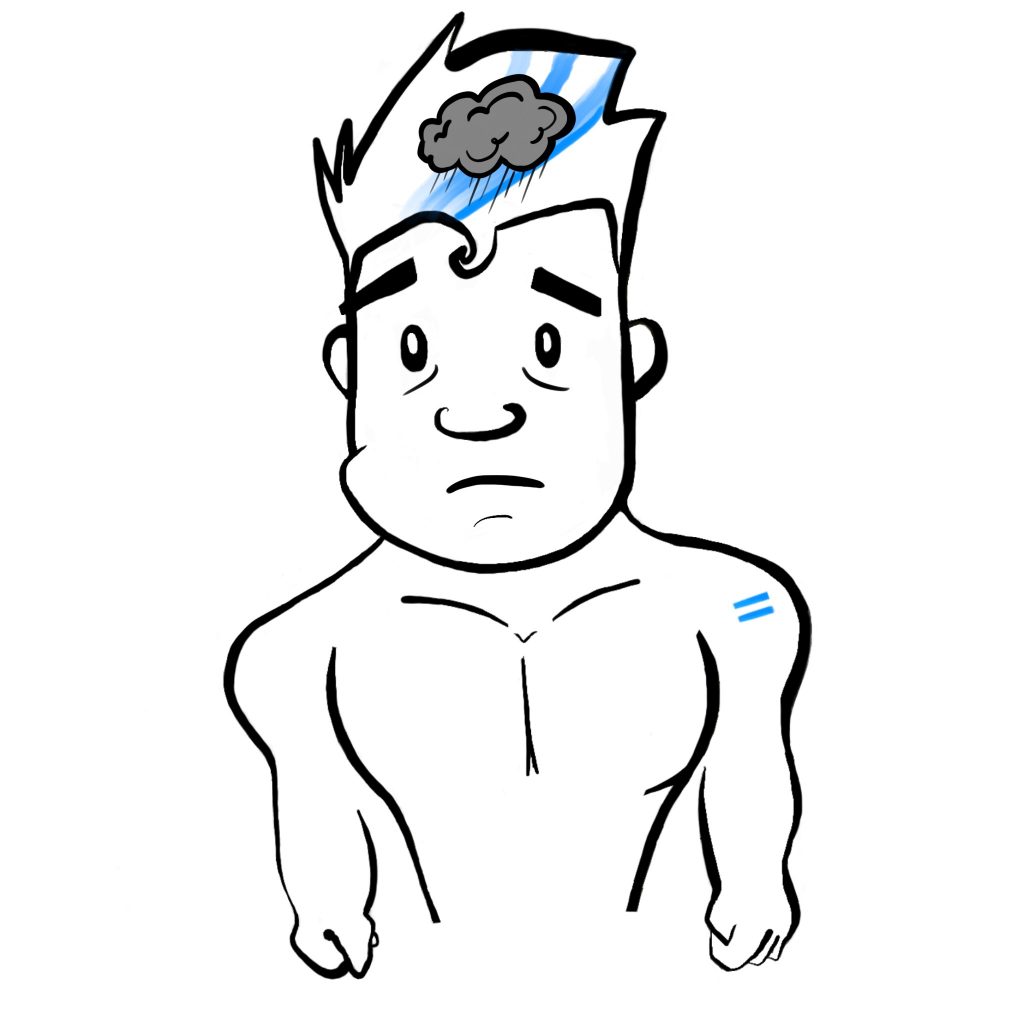
Depression
Clinical depression, or major depression, is a mood disorder characterized by profound feelings of sadness and hopelessness. For some people, it can be relatively short-term while in others it can persist as a chronic condition. We all feel bummed out at times, and feeling sad in response to an unfortunate event is normal. Clinical depression is different, and is not something you simply “snap out of.” Clinical depression can affect thought processes and often can prevent people from carrying out normal daily activities. While treating depression usually takes time, most individuals suffering from depression improve with counseling, medication, or both.
Depression most often develops during adolescence, or young adulthood, but can occur at any age. In Canada, about 5% of people at any one time will suffer from depression. For us gay guys, depression is more common. In a recent survey of men who have sex with men living in Ottawa, 13% reported symptoms of depression. The exact cause of major depression is not known, but may involve genetic factors that influence how the brain is wired and how signals in the brain called neurotransmitters regulate mood. Additionally, there are risk factors for developing depression such as traumatic life events, a family history of mood disorders and other mental illnesses, having a history of chronic illness, and alcohol or recreational drug use. Being a minority also increases the risk of depression. Among gay men, a history of being bullied as a child, not feeling safe at home, school or work, and a lack of family or other social supports all contribute to an increased risk of depression. If untreated, depression can lead to social isolation, interpersonal conflicts, unemployment, physical symptoms, and self-harm or suicide.
During depressive episodes symptoms occur throughout most of the day, and are present nearly every day for at least two weeks. Symptoms can include feelings of sadness, worthlessness, hopelessness, and irritability, diminished interest or pleasure in activities that normally provide enjoyment, changes in appetite, changes in sleep patterns including either insomnia or sleeping too much, feelings of fatigue or lethargy, trouble concentrating and making decisions, and frequent or reoccurring thoughts of self-harm and suicide.
If you are experiencing depressive symptoms, you should make an appointment with your doctor or a mental health professional. Diagnosis of major depression is based on your symptoms, as well as their duration and impact on your daily function. Your doctor may also order blood tests and perform a physical examination in order to rule out underlying physical causes of your symptoms
Effective treatment for most people with depression includes psychotherapy, medication, or both. Psychotherapy, sometimes referred to as counseling or talk therapy, is an important component of the treatment for depression. It typically involves one-on-one, structured sessions with a psychiatrist, psychologist, or other mental health professional. The most widely used evidence-based form of psychotherapy is called cognitive behavioral therapy (CBT). CBT focuses on identifying and correcting maladaptive beliefs, and on learning effective coping mechanisms. CBT is often referred to as “action-oriented,” as it spends less time on identifying the causes of depression and focuses more on developing strategies to decrease symptoms.
Medication also plays an important role in treatment, and many type of antidepressant medications are now available. The most commonly prescribed antidepressants include the selective serotonin reuptake inhibitors (SSRIs) such as Celexa, Lexapro, Prozac, or Zoloft; and serotonin-norepinephrine reuptake inhibitors (SNRIs) such as Cymbalta or Effexor. These drugs are considered safer than many other types of antidepressants, and generally cause fewer side effects. When treating depression with medication, patience is required. Some medications may take several weeks or longer to take full effect, and you may need to try several different medications to find what works best for you. This can lead to frustration, but don’t give up. If you are taking an antidepressant and decide to stop, please talk to your doctor first. Abruptly stopping some medications can result in withdrawal-like effects.
Lastly, there are lifestyle interventions that can help manage depressive symptoms. Getting adequate sleep, eating a nutritious diet, exercising regularly, participating in activities you enjoy, and connecting with friends and your social support network are all important.
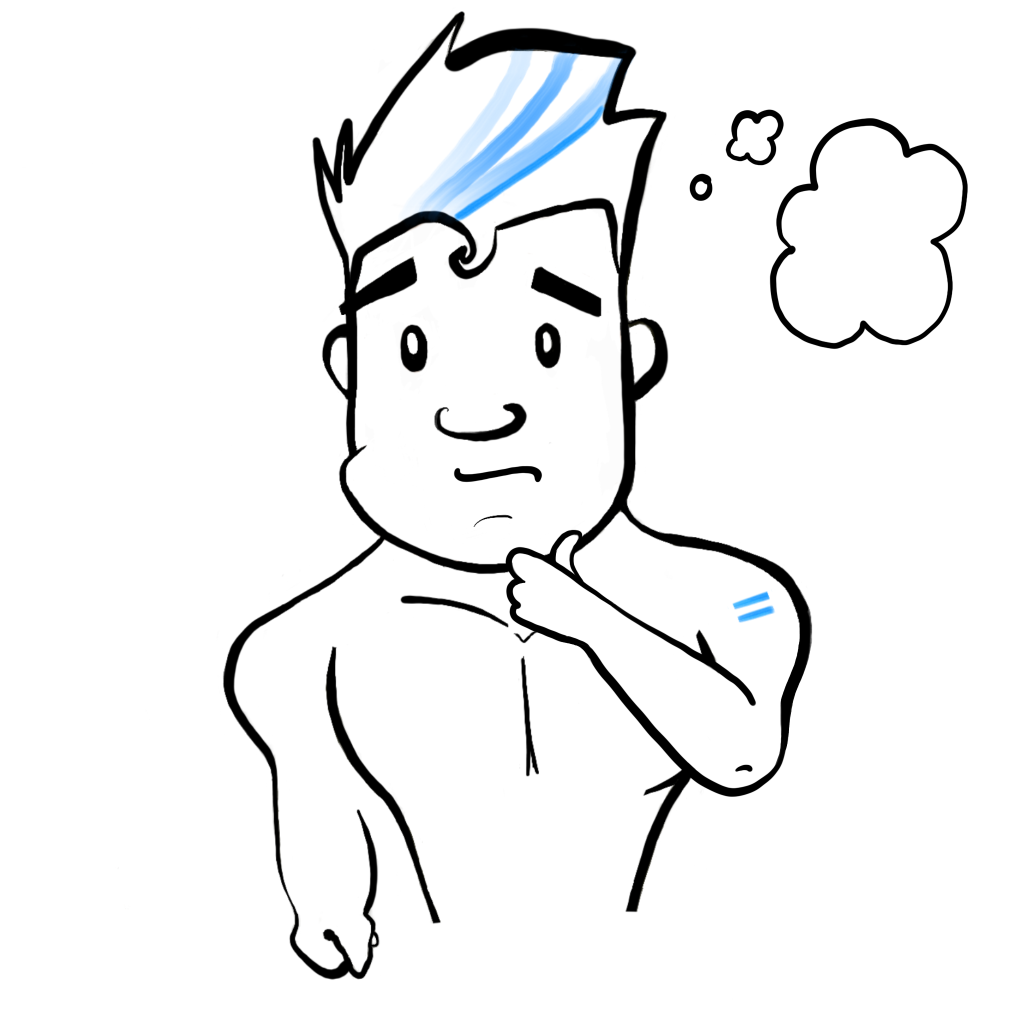
Anxiety
Anxiety disorders are mental health conditions that are characterized by frequent, intense, and excessive worry or fear. People with an anxiety disorder are often referred to as “nervous individuals.” Anxiety may be continuous, or manifest as sudden feelings of intense fear or worry that reach a peak within minutes. The rapid onset of fear is called a panic attack or anxiety attack, and may be indicative of an anxiety disorder. While experiencing occasional anxiety is normal, those with an anxiety disorder have symptoms that are long lasting, difficult to control, and interfere with daily activities. As a result, anxiety disorders can cause difficulties at school or at work, and within relationships. Individuals suffering with anxiety may be so fearful that they are reluctant to leave their house or apartment and avoid people, places, or situations that they anticipate will trigger feelings of worry or fear. Chronic anxiety can also lead to drug or excessive alcohol use in an effort to manage or numb the fear. Examples of common anxiety disorders include generalized anxiety disorder, social anxiety disorder, and specific phobias.
Anxiety disorders often occur in children, teens, and young adults, but can occur at any age. In Canada, about 12% of people suffer from an anxiety disorder. For us gay guys, anxiety is a little more common. In a recent survey of men who have sex with men living in Ottawa, 17% reported symptoms of anxiety. Anxiety may be caused by genetic factors that predispose people to feeling vigilant or fearful. Risk factors for developing an anxiety disorder include having a family member with an anxiety disorder, experiencing a traumatic life event, and chronic physical illness. In addition, being a minority also increases the risk of developing an anxiety disorder.
Symptoms of anxiety vary depending on the type of anxiety disorder. However, general symptoms of anxiety include feeling nervous or tense, muscle tension and pain particularly in the neck and shoulders, insomnia, having a sense of impending doom or danger, having difficulties controlling worry, and avoiding activities or interactions that may trigger anxiety. Panic attacks are characterized by the rapid onset of intense fear causing disorientation and an inability to focus, rapid breathing, increased heart rate, sweating, and trembling.
If you are experiencing excessive or persistent anxiety, you should make an appointment with your doctor or a mental health professional. The diagnosis of an anxiety disorder is based on feelings of excessive anxiety or worry that are present most of the time over at least 6 months and are associated with a number of activities or events. People with an anxiety disorder find it difficult to control worrying to the point that it disrupts daily activities and may have insomnia, muscle tension, or difficulty concentrating. Your doctor may also order blood tests and perform a physical examination in order to rule out underlying physical causes of your symptoms.
Anxiety disorders are treated with psychotherapy, medication, or both. Psychotherapy, sometimes referred to as counseling or talk therapy, is an important component of the treatment for anxiety. It typically involves one-on-one, structured sessions with a psychiatrist, psychologist, or other mental health professional. The most widely used, evidence-based form of psychotherapy is called cognitive behavioral therapy (CBT). CBT focuses on identifying and correcting maladaptive beliefs, and on learning effective coping mechanisms. CBT is often referred to as “action-oriented” as it helps individuals learn to manage their symptoms and develop strategies to lower their anxiety.
Your physician may prescribe medications to help relieve your anxiety symptoms. These may include medications that are also used to treat depression such as the selective serotonin reuptake inhibitors (such as Celexa, Lexapro, Prozac or Zoloft), and serotonin-norepinephrine reuptake inhibitors (such as Cymbalta or Effexor). When taking these medications, patience is required, as it may take several weeks or longer for them to take full effect. In some cases benzodiazepines (such as Ativan) may also be prescribed to relieve anxiety. Benzodiazepines usually help ease symptoms within minutes to hours but also wear off sooner than other medications. Continuous use of benzodiazepines is not generally recommended as this can lead to decreased effectiveness and the need for higher doses, as well as dependence on these medications and withdrawal symptoms including rebound anxiety when they are stopped.
Lastly, there are lifestyle interventions that may help manage anxiety. Getting adequate sleep, eating a nutritious diet, and exercising regularly are all important. It is also important to avoid caffeine and nicotine, as well as excessive alcohol.
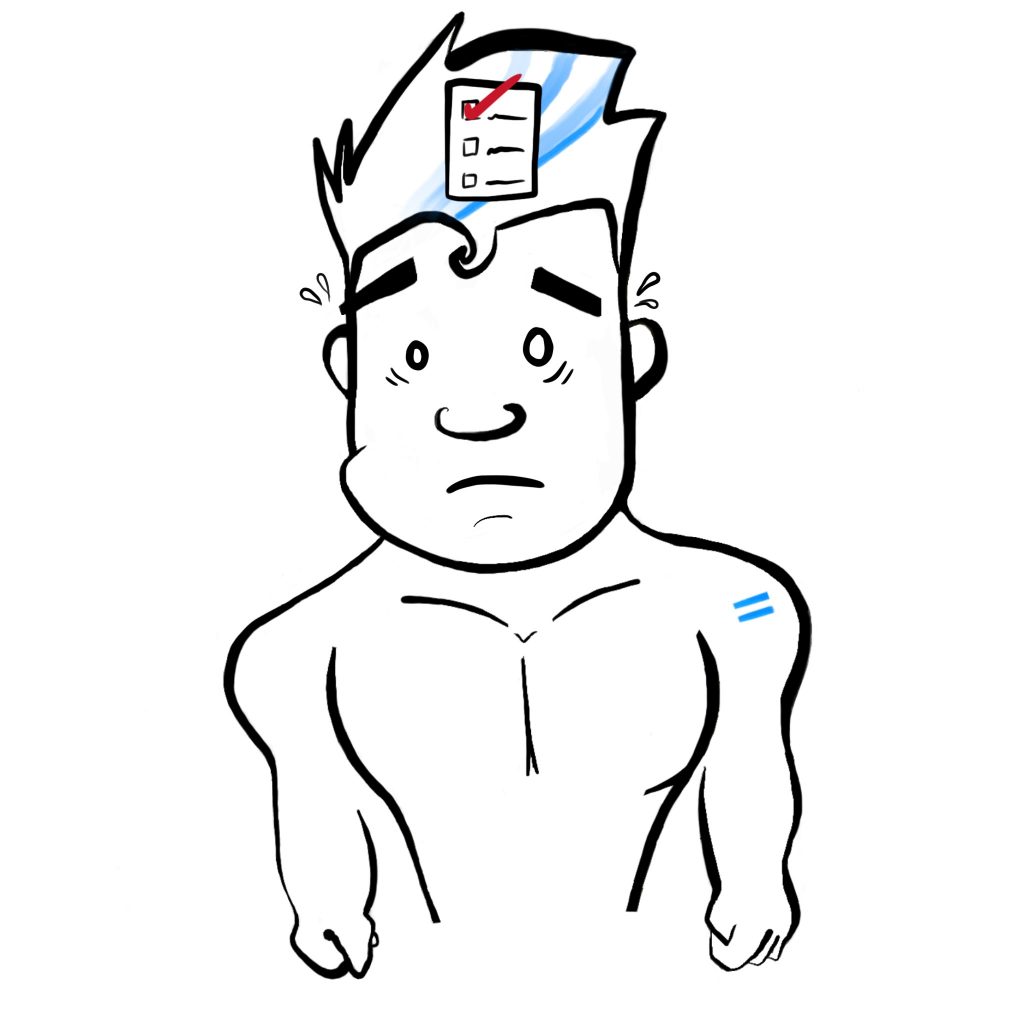
Obsessive-Compulsive Disorder (OCD)
Obsessive-Compulsive Disorder (OCD) is characterized by the presence of uncontrollable and unwanted worries, fears, or urges (obsessions) and the performance of repetitive behaviours (compulsions) as a means of controlling or relieving those fears or urges. For those with OCD, these obsessions and compulsions are often irrational, but are also inescapable, and interfere with daily living and activities. The degree of OCD can vary from person to person. For some, it can be relatively mild and manageable while for others obsessions and compulsion can take up considerable amounts of time and cause significant distress.
The cause of OCD is not fully understood, but it is often associated with anxiety disorders, a heightened sense of responsibility, perfectionism, and difficulty accepting uncertainty.
OCD is a mental health condition that may involve only obsessions or compulsions but typically involves both. Obsessions are repetitive, unwanted and persistent thoughts, fears or impulses that intrude on other thoughts and cause distress. Examples of obsessions include an excessive fear of germs, and an uncompromising need for order and symmetry. Compulsions are behaviours those with OCD are driven to perform as a means to reduce anxiety related to obsessions or to prevent something bad from happening. While usually done in response to obsessions, compulsive behaviours rarely provide much relief, and do not provide pleasure. Examples of compulsions include frequent washing or cleaning due to fear of germs or dirt, repeatedly checking things, such as if the door is locked or the stove is off, that one may associate with danger, constantly rearranging objects so that they are ordered and symmetrical, and repeating tasks many times to ensure they are performed correctly. Obsessions and compulsions are usually distressing, can take up a significant amount of time, and get in the way of normal functioning and daily routines.
Diagnosis is based on symptoms and the degree to which obsessions and compulsions interfere with normal thought patterns and daily living. OCD may occur along with other mental health problems such as anxiety disorders, which at times can make diagnosing OCD more difficult.
The main treatment options for OCD are cognitive behavioral therapy (CBT) and medications. Treatment is generally more effective when these are provided in combination. The goal of treatment is to allow individuals to effectively manage their symptoms so that OCD does not control their lives. Cognitive behavioral therapy is a type of counseling done with a mental health professional. CBT focuses on recognizing the symptoms of OCD and learning ways to overcome obsessions and compulsive behavours. One technique in CBT often used to treat OCD is called exposure and response prevention (ERP). During ERP, individuals are exposed to situations that bring out an obsession and learn ways to cope while abstaining from compulsive behaviours.
Medication can also help manage obsessions and compulsions. The most effective medications are antidepressants including the selective serotonin reuptake inhibitors (such as Celexa, Lexapro, Prozac or Zoloft), and serotonin-norepinephrine reuptake inhibitors (such as Effexor). When taking these medications, patience is required, as it may take several weeks or longer for them to take full effect.
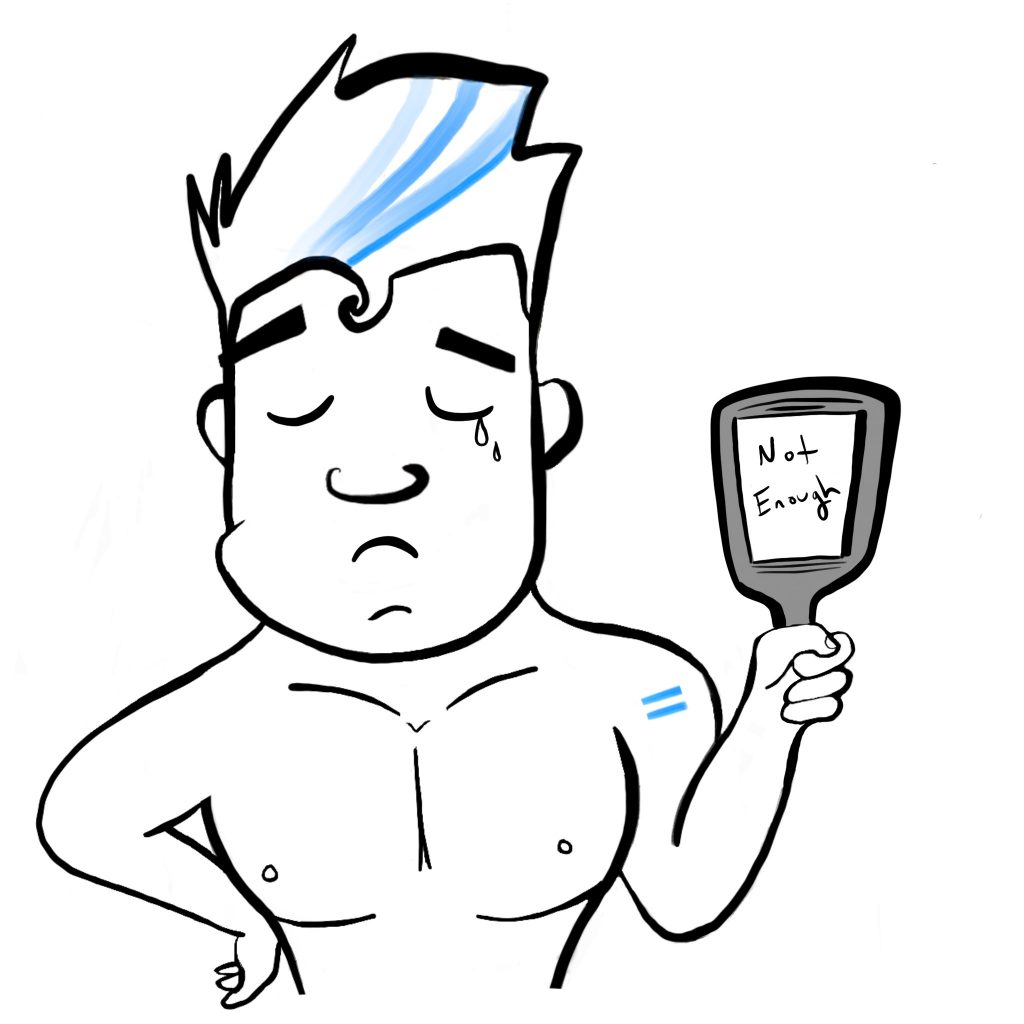
Body Dysmorphic Disorder
People with body dysmorphic disorder (BDD) have persistent and intrusive negative thoughts about an imagined or actual imperfection in their physical appearance. These physical imperfections may be minor or even unnoticeable to others, but can cause embarrassment and anxiety for those with BDD. Because of this, individuals with BDD may avoid situations where they fear others will judge their appearance and can become socially isolated. BDD can cause individuals to constantly check in the mirror, or search for reassurance from others. People with BDD may also use numerous cosmetic products, or seek plastic surgery in an attempt to “fix” their appearance. These steps may provide temporary satisfaction, but typically anxiety resumes and individuals continue to try to overcome their imperfection.
Body dysmorphic disorder commonly develops during adolescence, and affects equally both men and women. Us gay guys are at particular risk of have a negative body image. In fact, in a survey of gay and other men who have sex with men living in the Ottawa region, 31% indicated they were somewhat dissatisfied or dissatisfied with their body image. Being dissatisfied with your appearance, however, is not quite the same as suffering from BDD. The cause of BDD is not fully known. It is thought to relate to how the brain is wired and how signals in the brain called neurotransmitters process information. Social factors also have a strong influence. Bullying as well as physical, emotional, and sexual abuse during childhood can lead to BDD. Certainly the emphasis among gay guys on having a ripped and muscular body does not help.
Body dysmorphic disorder is characterized by an obsession with an imagined or real imperfection in physical appearance leading to repetitive behaviours to check or cover up the imperfection, and causes significant distress and social inhibition. Some people with BDD may obsess over their appearance for hours or even the entire day, and completely avoid social interactions. Other signs of BDD can include behaviours that are difficult to control such as continually checking one’s appearance in the mirror, constant grooming, attempting to mask or hide physical imperfections, repeated cosmetic surgeries with little to no satisfaction, seeking constant reassurance from others about your appearance, and frequently comparing your appearance to others. Body parts that are often the focus of scrutiny include the face (nose shape and size, wrinkles, complexion), hair (thinning or balding), muscle bulk and tone, and body weight.
If your appearance is causing you anxiety, you should talk to your doctor or a mental health professional. Unfortunately, many people with BDD are so embarrassed by their appearance they do not seek help and instead pursue surgery or other means of dealing with physical imperfections. Binge eating, a restrictive diet, or working out excessively at the gym to gain or lose weight or muscle mass may be a sign of BDD. BDD can also lead to depression, anxiety, self-harm and suicide. If your appearance is causing you anxiety, talk to someone.
Treatment of BDD typically includes one-on-one therapy with a mental health professional and medications. The form of therapy most commonly used is cognitive behavioural therapy (CBT) where the goal is to help individuals identify irrational and negative thoughts about their appearance and overcome these thinking patterns with a more realistic view of themselves and others. CBT can help control urges to check your appearance in the mirror or solicit reassurance from others while encouraging social engagement.
In addition to CBT, many individuals with BDD respond well to antidepressants called selective serotonin reuptake inhibitors (SSRI). SSRIs work by increasing levels of serotonin in the brain, and have been shown to be effective at helping control obsessions and repetitive behaviours associated with BDD. Commonly prescribed SSRIs include Celexa, Lexapro, Prozac and Zoloft. Remember, when being treated with these antidepressants, patience is required as these medications may take several weeks or longer to take full effect.
As with any mental health condition, staying socially active, eating a nutritious diet, getting adequate sleep, and exercising regularly can help increase your confidence and promote positive mental health. However, restrictive diets and over exercising at the gym to overcome perceived flaws in appearance are unhealthy.